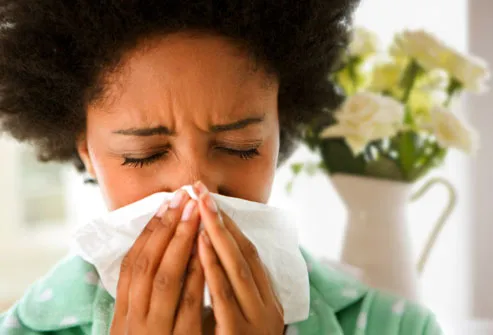Have you ever experienced a sudden onslaught of weird rashes all over your body? Or maybe you suddenly find yourself having a perpetually runny nose and an unending sneezing fit? The reason is not far-fetched, you are simply suffering from ALLERGIES. Rashes and sinus reactions are the commonest forms of allergic reactions, but allergies could manifest in a lot of ways.
Allergies are, simply put, your body’s immune system over-reacting to perceived threats to your health. The immune system sees otherwise harmless substances called ALLERGENS as harmful invaders and this triggers the production of Immunoglobin E (IgE) antibodies. The antibodies are then carried to cells which produce histamine and other chemicals. Thee chemicals are responsible for making you miserable, they cause the reactions.
Allergic reactions range from mildly irritating to life-threatening. Highly allergic people are termed as being ATOPIC. Allergies are termed unusual reactions because most of the substances that ATOPIC people react to are safe for some other people.

What Body Parts do Allergies Affect?
Most allergic reactions affect different parts of the body. The most affected organs are
- The skin
- Lungs
- Sinus
- Nose
- Eyes
- Stomach lining
- Throat
- Ears
If you experience a sudden unexplainable breakout on any of these organs or body parts, especially after coming in contact with a particular substance, you could be allergic.
Who is Most Susceptible to Allergies?
ATOPY is defined as the genetic pre-disposition to be allergic. People who have a family history of allergies, regardless of the type, will probably end up developing some form of allergy themselves.
Also, an asthmatic person is more likely to develop Nasal allergies, as asthma sufferers often have allergic asthmas where they react to things like grass smells.
A lot of kids whose parents are not allergic could still develop allergies. In cases where a parent might suffer a particular allergy, this increases the likelihood of their children being allergic, but not necessarily to the same allergens.
An allergic person suffers the likelihood of being allergic to more than one substance.
ALSO READ: EXPERTS LOOK TO END THE MENACE OF ASTHMA IN NIGERIA
Common Allergic Reactions

Rhinitis: This is an allergic reaction that manifests in a manner similar to the common cold. Sneezing, wheezing, stuffy nose and throat, runny noses, itchy eyes among other symptoms. Most nasal allergies develop as a response to airborne allergens.
Itching skin and rashes: These skin reactions could be from contact with certain chemicals or biological allergens. Food allergies may also give a similar reaction.
Hives: These are unsightly skin reactions that develop into large lumpy mounds all over the skin. They are quite itchy and uncomfortable and usually get worse with heat and sometimes at night.
Vomiting, Diarrhea: These symptoms accompany allergic reactions from food. When the reaction affects the stomach linings then, we would see a lot of such reactions.
Anaphylaxis: Is the most severe allergic reaction. Anaphylactic shock is a fatal situation where the reaction is capable of killing the individual. Anaphylaxis is not tied in with any particular allergy but is a severe reaction to any allergy. The time between exposition to the allergens and onslaught of reaction may vary from a few seconds to hours.
Anaphylaxis can be identified by a tightening of the throat, inability to breath, sometimes hives break out on the skin, vomiting, diarrhea, loss of consciousness, rapid pulse, blood-pressure drops and others. People with severe allergic reactions are advised to go around with an epinephrine injector for emergency situations. Even after it appears that symptoms are allayed, it’s better to seek medical attention in case of delayed reactions.
Most Common Allergens
Some of the most common things that would go unnoticed on a daily basis could be the cause of serious allergies for allergies people.
- Pollen
- Seasonal allergies
- Dust mites’ excrement
- Latex
- Cockroaches
- Household chemicals
- Metals; Nickel, cobalt, chromium, zinc, copper.
- Medication
- Cat saliva
- Insect stings; including wasps, bees, mosquitoes, fire ants, fleas, horseflies, black flies, among others
Food allergies are also quite common and rampant. The most common food allergies are Groundnut/peanut allergy and seafood allergies.

Food allergies include:
- Peanut allergy
- Shellfish allergy; fresh prawns, shrimps, crabs…
- Fish allergy
- Milk allergy
- Allergy to soy
- Nut allergies
Allergy Tests
If you suspect yourself or your child might be suffering from some unknown allergy, you could confirm by carrying out an allergy test. A doctor will ask a lot of questions to establish medical history before prescribing a test. Allergists are allergy specialists who carry out tests and prescribe allergy medication and control measures. There are various types of allergy tests.
- Blood tests
- Patch test
- Skin prick tests
About 30% of the civilized world suffers from some sort of allergy. Some children outgrow their allergy, but not all do. Always remember, if in doubt, see a doctor.











Your blog post immediately caught my attention! Since stumbling upon your blog, I have been completely absorbed in your other articles. The engaging content you provide has left me wanting more. I have subscribed to your RSS feed and am eagerly looking forward to your future updates!Until then.
Really useful post with tips I can actually use. Keep it coming!
Your point of view caught my eye and was very interesting. Thanks. I have a question for you.
I don’t think the title of your article matches the content lol. Just kidding, mainly because I had some doubts after reading the article.